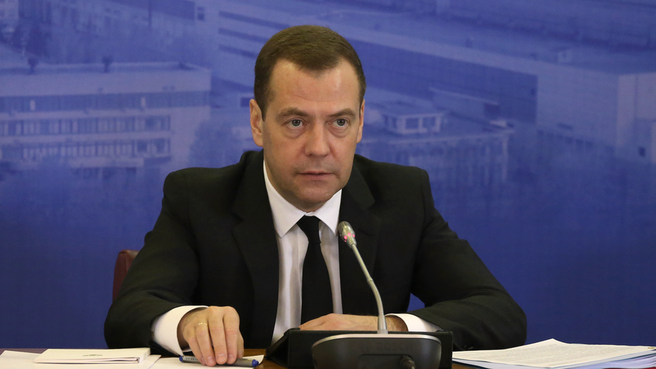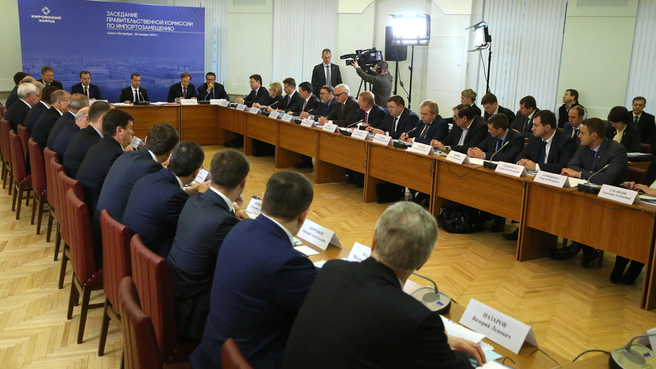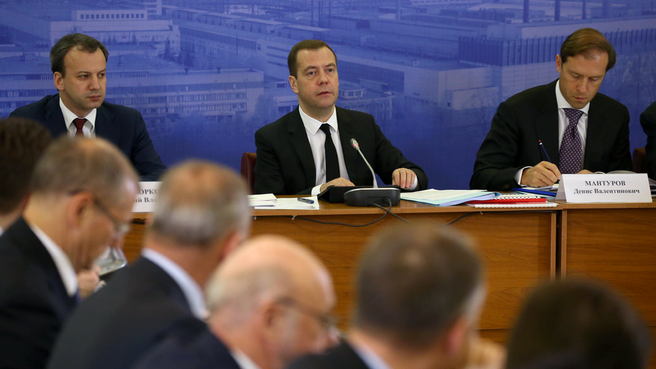Agenda: implementation of the import substitution policy within the Eurasian Economic Union and in the agricultural machinery industry.
From Dmitry Medvedev’s opening remarks:
I have signed a government directive approving a programme to support the transport machine manufacturing sector in 2016. The programme is designed to ensure the comprehensive development of the sector. We plan to support investment projects to modernise and expand capacity to cast large-sized railway car components, as well as joint projects with foreign railway machinery manufacturers. This will improve the safety of rail carriers, primarily rail freight, facilitate the optimisation of the manufacturing capacities of many enterprises and upgrade the rolling stock. We will be able to export our transport machinery and we have a good head-start here. In the first 10 months of last year, exports in this sector were up by almost 53 percent.
Also, a government directive was signed approving the procedure for the provision of federal budget subsidies to industrial cluster project participants. These subsidies will be used to reimburse some of the costs involved in the implementation of joint projects to manufacture industrial goods as part of import-substitution programmes. These funds will help develop industrial cooperation, create jobs and make our products more competitive.
At least three such industrial cluster projects will receive state support.
There are two prime objectives under the import-substitution programme. First, the commission should make decisions regarding the expediency or inexpediency of procuring machine-manufactured goods abroad based on an analysis made by the Ministry of Trade and Industry. Does Russia have analogous goods that are required to carry out import-substitution investment projects? If it does, a recommendation should be made to procure them [at home], but only if these goods meet quality standards.
Amid the sanctions, which, among other things, limit technology transfers to us, it is important to move away from the practice of procuring a package of services rather than technology. They use different sectors, including oil production. Drilling a hole is contracted to a foreign company that brings its own equipment, does the prospecting, drills and installs a pipe. As a result, we are left with only a pipe and zero prospecting and drilling technology. This is wrong. This is not to say that we should completely eliminate this system of providing services but it is cannot be our strategic course. We need our own technology, our own production and our own services market.
Certain types of goods will be procured abroad subject to approval by the commission. We cannot give up imports completely, but we are in a position to significantly reduce our overall dependence, which is precisely what our manufacturing companies show.
There is the issue related to the implementation of the import-substitution policy in the framework of the Eurasian Economic Union. EurAsEC member states have considerable potential. We need to expand cooperation with our partners as a whole, as well as with individual companies. Last year, the Eurasian Intergovernmental Council approved Guidelines for Industrial Cooperation. Increasing the share of jointly manufactured goods on the EurAsEC common market is a key priority. A list of priority types of economic activity has been drawn up. A total of 20 branches and 15 sectors in the scientific, technical and innovative spheres were singled out for Russia.
Given our scope and potential, Russia should take a proactive position to the maximum degree possible and offer its partners specific goods and services that we could provide, as well as possible co-financing mechanisms for import-substitution programmes.
Today, there are still a number of barriers in the Eurasian Economic Union to state procurements, technical regulation, intellectual property and taxes. It is essential to consider what decisions the government should take in this regard.
Between January and November 2015, Russian agricultural machinery exports were up nearly 70 percent, year on year, at about 11.5 billion roubles. Naturally, the devaluation of the rouble was also a factor but in this situation we have to use all factors, including those related to the weakening of the national currency. In any event, these are not bad indicators, pointing to the effectiveness of import-substitution programmes in this sphere.
I have made the decision to provide additional funding in 2016 in subsidies to agricultural machinery and equipment manufacturers in the amount of 10 billion roubles in addition to what we had. Another 500 million roubles will be provided this year to upgrade the technical fleet of higher educational establishments that answer to the Ministry of Agriculture.














